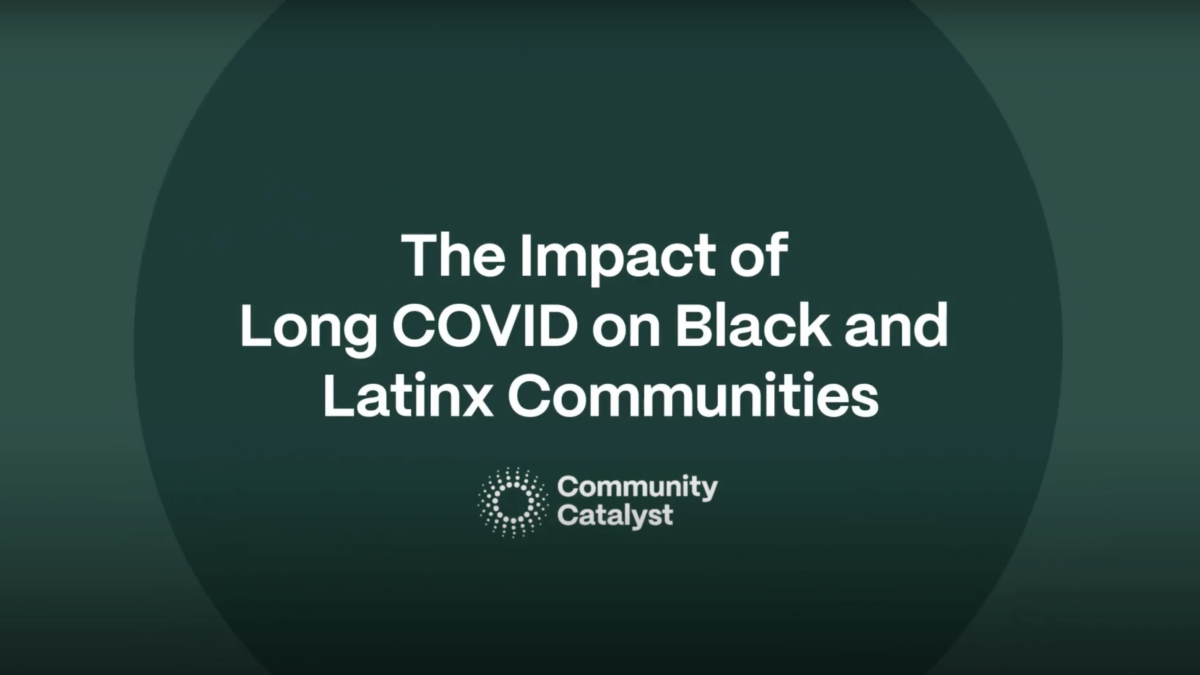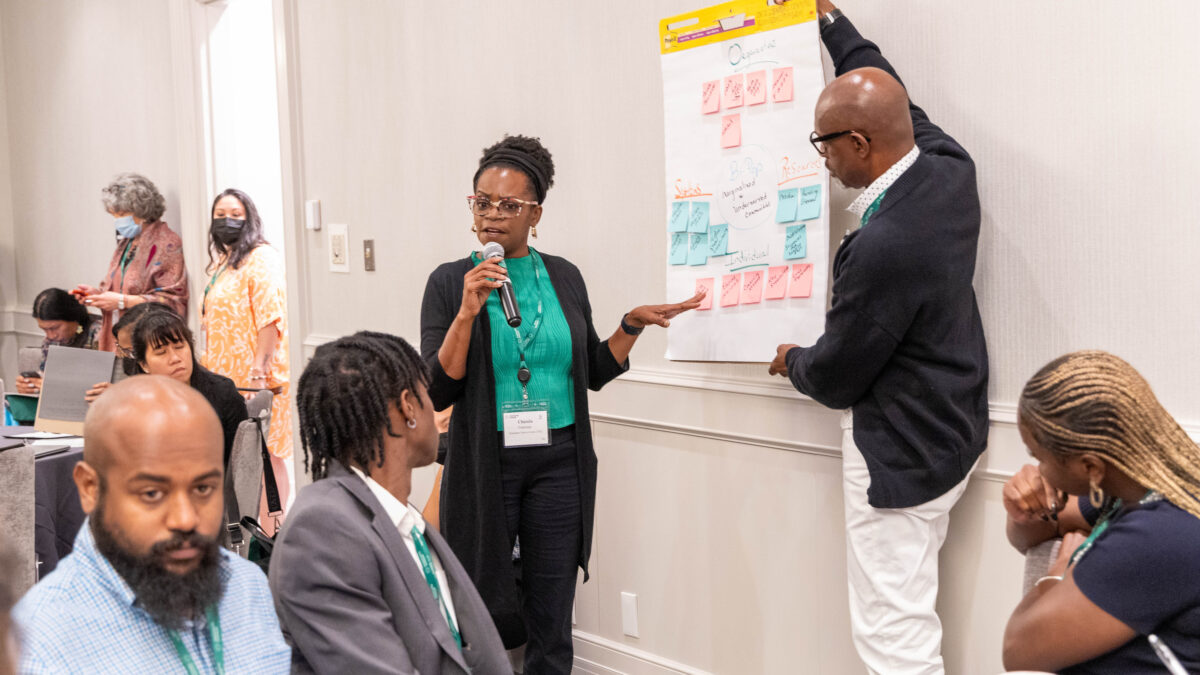A Public Health Crisis at a Crossroads: The Urgent Need for Community-First Solutions
As we mark five years since the COVID-19 pandemic began; our public health system is under attack. The Trump administration is back in power, rolling back critical public health protections, slashing essential programs, and deepening distrust in science. Dangerous misinformation, fueled by conspiracy theorists like HHS Secretary Robert F. Kennedy Jr., is eroding confidence in vaccines and leading to preventable disease outbreaks in every corner of the country. These deliberate choices put ideology over public health, worsening conditions for communities already struggling to recover.
For decades, the health system has failed Black, Latinx, Indigenous, and low-income communities—those hit hardest by the pandemic. When George Floyd was murdered, cities and states declared racism a public health crisis, yet little has been done to address its root causes. Racism remains a health and economic catastrophe, disproportionately impacting the very communities that have been historically denied care. Instead of fixing these structural failures, the Trump administration’s policies are widening the divide—gutting public health infrastructure, cutting Medicaid, and putting corporate profits ahead of people’s health.
A Community-First Approach to Public Health
The only way forward is to invest in communities. Long COVID, vaccine-preventable diseases, and growing health inequities demand solutions led by the people most impacted. While public health agencies should be the backbone of our nation’s health system, they lack the resources and capacity to meet community needs. Meanwhile, community-based organizations (CBOs)—that have the relationships and trust necessary to support people—are chronically underfunded.
For more than 25 years, Community Catalyst has worked alongside local, state, and national partners to center community voices and push for policies aimed at improving the health of all communities by ensuring access to essential prevention services, as well as comprehensive coverage and care. Focused on growing vaccine confidence, access, and availability among communities of color, Community Catalyst’s work during the pandemic proved that community-first approaches are not only effective, but essential. Our work on Long COVID builds on this foundation, ensuring public health responses are shaped by those most affected—not dictated by politicians and corporations.
The disparities in COVID-19 impacts highlight how wealth influences access to healthcare and resources, exacerbating inequalities. To truly address the lasting impact of COVID-19 and the resurgence of preventable diseases, we need a public health system that serves all of us, and ensures that all communities can thrive, not just the privileged few. That means:
- Investing in community-based organizations that provide direct support to those impacted by Long COVID and vaccine misinformation.
- Strengthening partnerships between CBOs, advocacy groups, and public health agencies and officials to ensure policies and funding reflect community needs.
- Committing to long-term funding for community-driven public health solutions, rather than short-term, reactive measures that disappear when the media moves on.
Addressing the Public Health Funding Gap
Public health funding is being systematically dismantled, leaving communities without the resources they need to recover and thrive. The Trump administration is gutting federal and state budgets, cutting Medicaid, dismantling the Affordable Care Act, and making it harder for people to access care. This isn’t just neglect—it’s an intentional effort to keep power and resources concentrated among the wealthy while leaving the rest of us behind.
The result? Public health programs are underfunded, health care costs are rising, and millions are left without support. While government agencies should lead in funding public health, their resources are often short-term, heavily restricted, and increasingly vulnerable to political interference. Philanthropies, policymakers, and health leaders need to put sustained, long-term investments into community-driven solutions that prioritize the needs of those most affected.
Funding must:
- Be flexible so communities can respond to emerging needs in real time.
- Provide multi-year support to ensure CBOs and advocacy groups have the stability to drive lasting change.
- Strengthen community-led solutions that address the root causes of health inequities.
- Prioritize those historically excluded from care, ensuring resources reach the people and places that need them most.
- Foster trust and accountability by investing in partnerships that center community voices in decision-making.
Community engagement, relationship-building, and systemic transformation take time—this work requires multi-year grants and unrestricted funding. By prioritizing investment in community-based organizations and advocacy groups like Community Catalyst, we can push back against government disinvestment and create a public health system that is truly accountable to the people it serves.
This is not just about Long COVID. This is about ensuring we are ready for the next public health crisis and breaking the cycle of neglect that has defined our response for far too long.
What can I do as an Advocate?
When community members work with health care systems and decision-makers to build lasting solutions, they bring new valuable lived experiences to the table — adding perspective that is essential to creating a society where health is right for all. Community members can help foster these connections by:
- Attending and speaking at public hearings, legislative sessions, or town halls to ensure community perspectives are heard directly by decision-makers.
- Connecting with local organizations and engaging in community efforts around public health issues.
- Using their voice to help apply consistent pressure on elected officials to follow through on promises and make lasting changes.
A Call to Action
The public health challenges we face demand bold action. We cannot allow conspiracy theorists and profit-driven politicians to dictate our future. As we reflect on the past five years, the question remains: Will we let history repeat itself, or will we finally build a health system that works for all of us?
At Community Catalyst, we are committed to fighting for a health system rooted in equity and justice—one that centers the voices of those most impacted and builds lasting solutions for generations to come. Join us in making this vision a reality. The health of our communities depends on it.

